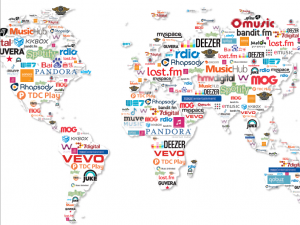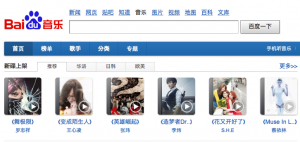
While Google has terminated its cooperation with Top100.cn and is retreating from the Chinese online music market, the Chinese government is building a new venture through which all Chinese music services would have to purchase copyrighted music.
More than ever before, in the next year we are going to see important developments in the China online music market.
"I Want To Break Free..."#
In July 2011, three major record companies (Sony, Warner and Universal) signed what Lachie Rutherford, President of Warner Music APAC called a "groundbreaking partnership" with China's largest search engine, Baidu. China, potentialy a huge market for the global music industry, was suffering from slow maturation and, of course, an estimated 99 percent digital piracy rate.
Despite its inherent difficulties, the online music industry was taking off when, in January 2012, Song Ke -- the GM of Warner Music China and one of the most popular music producers in China -- announced he was quitting the business to run a roast duck restaurant. "China’s music industry is at a crossroads," Song remarked at the time. He returned five months later...for good reason.
"It’s a Long Way to the Top..."#

China still has a very long way to go before it can be as profitable as the US or Japanese markets. According to the International Federation of the Phonographic Industry (IFPI), China’s music industry earned some US$82 million in 2011, with 76 percent of this total coming from digital sales.
But the way these sales are broken down in China differs from more established markets. If, for example, a song generates 100 yuan ($15) in revenue, only 2 yuan ($0.32) goes to music producers in royalties. The rest goes to telecom operators and a host of others. However, in the US, the world’s largest music market, music companies will make $10 from the same song.
Consequently, music producers have been hesitant to invest in new projects in China, afraid of seeing their investments go unprotected. Naturally, they have been looking for an solution to this conundrum.
"All You Need Is..."#

from 2013 onward, online music platforms in China will introduce free streaming but paid downloading. Several major music websites like QQ Music (owned by Tencent), Baidu Music (Baidu), and Xiami (Alibaba) will start to charge for music. Users will have access to a flexible choice of options according to their demands and economic stipulations. Listening to music should remain free and be compensated by advertising, but listeners will be charged for downloads.
The price range for these services will probably range from 1 yuan ($0.16) for one song to 15-20 yuan ($2.39-3.20) per month for unlimited downloads. This monetization effort could provide a breath of fresh air and raise the quality of China's online music industry, which relies, for the most part, on advertisements to hedge against still-high piracy rates.
"This is the End..."#

Going forward, we will likely see a stronger connection between the recent history of the monetization of the online gaming industry (credits or virtual currency, add-ons, VIP accounts) and the online music industry.
As usual when we talk about China, the potential is there: Despite being the most populous country on the planet and the second largest economy, its music sales ranked 22nd in the world.
Alexis Bonhomme is the Beijing-based general manager for Groupon-Tencent China (Groupnet), in charge of international premium brands and their digital strategies in marketing/advertising/social media/e-commerce/insights. Bonhomme works with three groups of clients: brands currently operating in China, brands planning to enter China, and brands targeting Chinese tourists.
